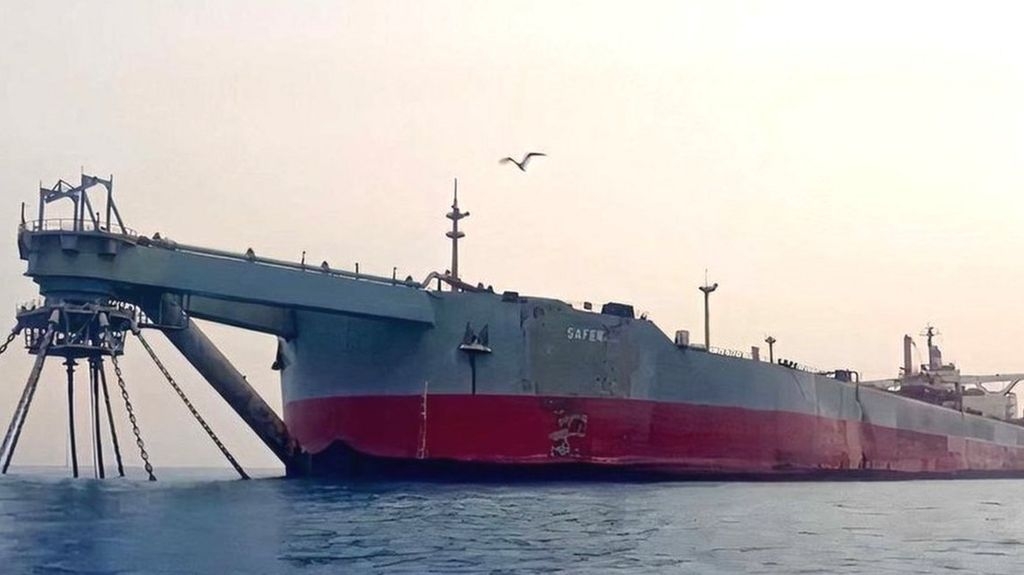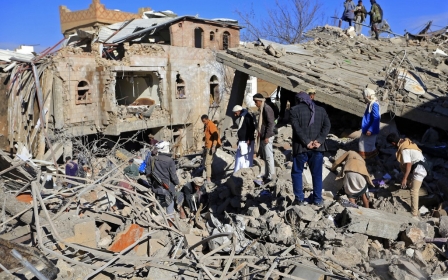Yemen awaiting 'disaster of dramatic magnitude' if Red Sea oil spill not averted

The world is quickly running out of time to stave off a "disaster of dramatic magnitude" in the Red Sea, the International Crisis Group (ICG) has warned, as a million barrels of crude oil from a decaying supertanker languish off the coast of Yemen.
Experts have cautioned that the large tanker-turned-floating storage and offloading vessel, the FSO Safer, could explode or break apart at any moment.
'Ports will be closed to all imports due to the spill, and the fishing industry will collapse'
- Joost Hiltermann, MENA director at ICG
"The humanitarian impact, in Yemen alone, will be a further slide into widespread famine," Joost Hiltermann, the MENA director at ICG, told Middle East Eye.
"Ports will be closed to all imports due to the spill, and the fishing industry will collapse," he added.
Stay informed with MEE's newsletters
Sign up to get the latest alerts, insights and analysis, starting with Turkey Unpacked
However, the work to repair the rusting ship has been delayed in part due to funding shortages and, to a greater extent, international neglect, he pointed out.
In a last-ditch attempt to raise the remaining $20m, in addition to the already secured $60m, the United Nations has turned to crowdfunding to secure the remaining amount.
Even Hollywood actor Leonardo DiCaprio weighed in on the issue, earlier this month, in a bid to raise awareness.
Hiltermann, however, is worried that any spill could widen the spectre of the conflict, bringing other international actors into the already fragile region.
"Given the Red Sea's strategic nature as a vital transport route; this can only further internationalise the Yemen war, which already became more complex due to outside involvement," added Hiltermann.
In Yemen, the warring parties, currently observing a tentative peace, could quickly turn on each other blaming each other for the disaster, which may very well result in "an intensified struggle over very scarce resources", said Hiltermann.
Hiltermann also blames the "sluggish response" of international stakeholders due to the "fact that governments tend to have small or no budgets for disaster prevention outside their borders", with national parliaments sceptical about whether any funds would end up making a difference.
Bargaining chip
The decaying 45-year-old oil tanker may not wait long for international governments.
Controlled by the Houthi group, abandoned and unserviced since maintenance operations were suspended in 2015, the oil tanker close to the Yemeni port of Hodeidah, has become, according to experts, a ticking timebomb.
Hannah Porter, a Yemen analyst at DT Global, an international development firm, said the issue should never have been politicised.
"The ship is a threat to all Yemenis, regardless of political affiliation," said Porter speaking to MEE, adding that "it's in everyone's interest for this threat to be neutralised immediately".
Environmentalists have warned the cost of the salvage operation, around $80m, would be a fraction of the estimated $20bn it would cost to clean up a spill.
Despite this, "the question of who owns the oil - who has the right to sell it, and where should that money go" has prevented the different Yemeni factions and their backers from agreeing to a common plan for resolving the situation, Porter said.
Meanwhile, tensions between the internationally recognised government and the Houthi group preclude an immediate resolution to this.
The UN has outlined a solution where the oil is simply offloaded onto another, more secure ship, therefore bypassing the need to immediately sell the oil.
Porter is concerned that even if the UN raises the money it needs, there is significant scope for the sides to pull out of a final arrangement.
"The FSO Safer has been a useful bargaining chip for the Houthis, and they were reluctant to give that up," said Porter. "I also suspect that the volatile nature of the Safer has somewhat acted as a deterrent for any coalition-supported military operations to retake Hodeidah port from the Houthis - again, something the Houthis would not want to sacrifice," she added.
Environmentally and economically, "there is no reason not to do everything possible to resolve this issue," says Porter, adding that "from a political perspective, some parties may see it as advantageous to let this issue fester, as it allows them to blame the other side for not solving it."
"This approach is a gamble, of course, because everyone will suffer when the ship ultimately leaks," she concluded.
Middle East Eye delivers independent and unrivalled coverage and analysis of the Middle East, North Africa and beyond. To learn more about republishing this content and the associated fees, please fill out this form. More about MEE can be found here.



